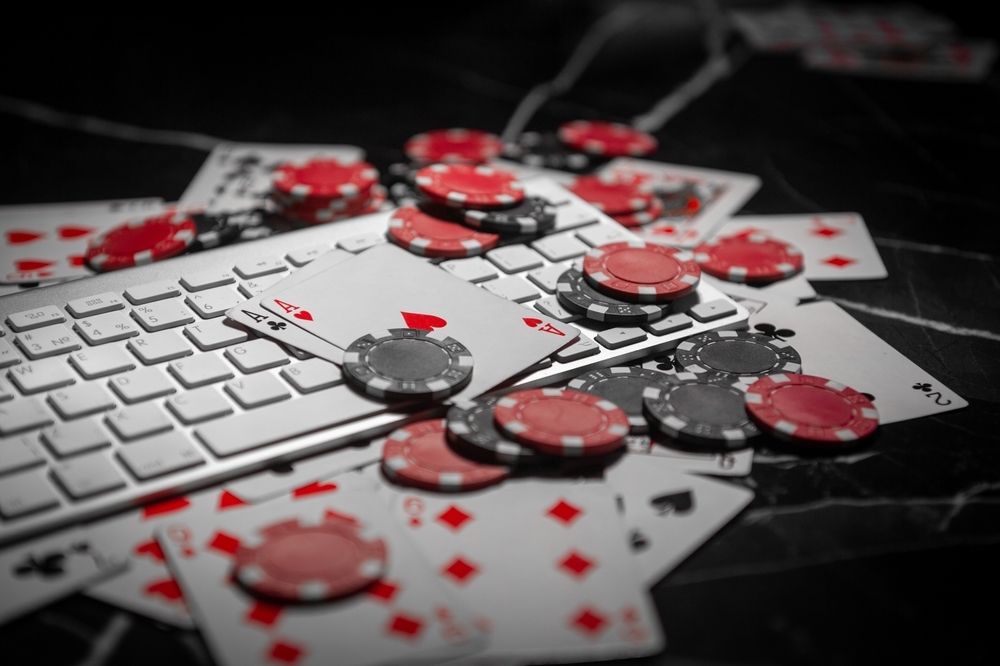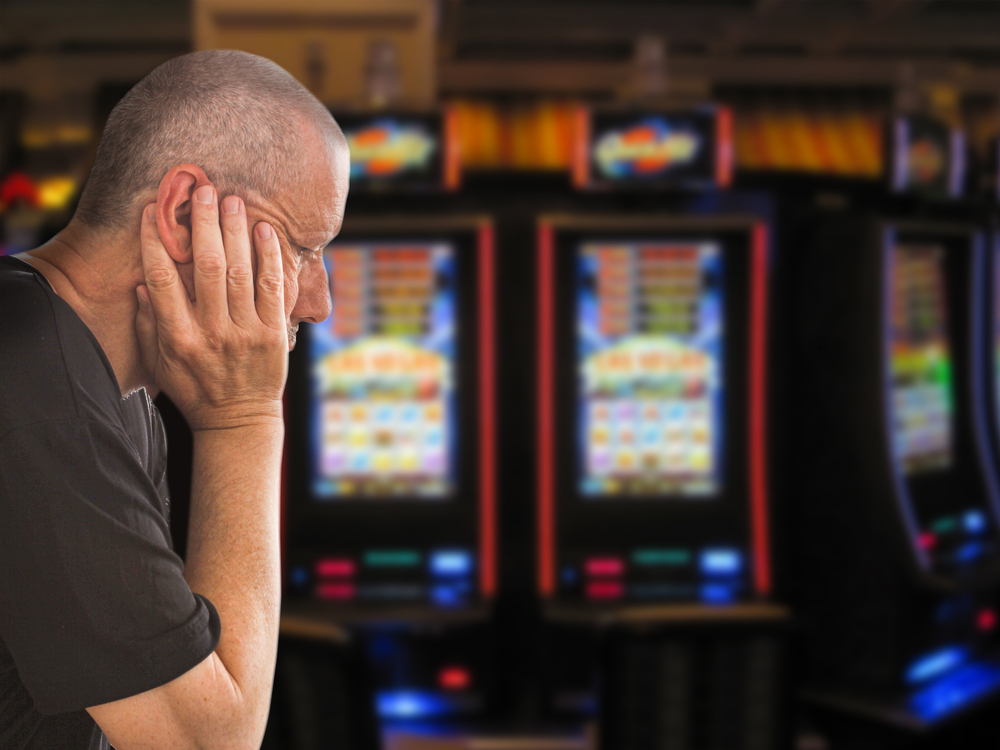Last Updated:
July 21st, 2025
Gambling Addiction | Symptoms, Effects and Causes
The UK gambling industry is booming, with sports betting, online gambling casinos and gaming machines drawing in millions of players daily. But behind the flashing lights and promises of big wins, gambling addiction is wreaking havoc on sufferers and their families. The lure of quick money can lead to financial devastation, stress and a cycle of compulsive behaviour that can take over and then ruin your life. Understanding the risks of gambling addiction is the first step in breaking free and preventing serious, permanent harm to yourself and your loved ones.

What is gambling addiction?
The simplest gambling addiction definition is an overwhelming need to continue gambling despite the detrimental effects it is having on your life. Gambling addiction is a process or behavioural addiction because it involves a compulsive pattern of behaviour rather than an addiction to substances like drugs or alcohol.
With advancements in technology in the realms of online gambling and electronic betting systems, more people are falling into the trap of gambling addiction. Online gambling, in particular, has had a huge impact with digital slot machines with digital slot machines and virtual sports betting, making it easier for people to gamble 24/7. In 2022, it was estimated that around 246,000 people in the UK had a gambling addiction, but in 2023, the Gambling Commission said this number could be nearer 1.3 million.
How does a gambling addiction start?
For many, gambling starts as an innocent thrill as they enjoy the excitement of a win or even just the rush of placing a bet. However, that excitement can have a powerful pull on some people, leading to a cycle of chasing losses, taking bigger risks and struggling to walk away.
There are actually surprising similarities between how gambling and substance use affect your body. Just like drugs and alcohol, gambling stimulates the brain’s reward system. When you place a bet, especially when you win, dopamine is released, a neurotransmitter linked to pleasure and reward. This chemical release can create a high similar to that provided by substances, reinforcing the gambling behaviour and making the experience one to seek out repeatedly.
In some people, gambling addiction can even cause symptoms similar to substance cravings or withdrawal. This means intense urges to gamble or discomfort and irritability if you try to stop or cut back. What often happens at this point is that bets begin to escalate both in frequency and size. This is very similar to a growing drug or alcohol tolerance where small, irregular bets no longer satisfy the need.
As your gambling escalates so do the resulting problems, locking you in a cycle of stress and more gambling as you chase your losses and become ironically reliant on gambling to try and avoid the problems it is causing.
Spotting the warning signs of gambling addiction
Gambling addiction isn’t always obvious at first. Unlike drugs or alcohol, there may not be any physical indication that someone is struggling, which makes it easy for the problem to grow in silence. However, there are some telltale addiction signs and symptoms which should be taken seriously:
- Continual preoccupation with gambling, where your thoughts frequently revolve around past experiences or when you can place the next bet.
- An increasing pattern of risk-taking in gambling where larger amounts of money are wagered more frequently.
- Attempts to cut back or stop gambling altogether repeatedly failing.
- The constant attempt to ‘break even’ or recover losses through further gambling.
- Feelings of irritability, frustration or distress when trying to refrain from gambling.
- Experiencing financial difficulties such as accruing debt or borrowing money to sustain gambling habits.
- Gambling taking precedence over important personal, professional or academic responsibilities.
- Frequently lying to family and friends about the extent of your gambling or the associated financial troubles.

The dangers of gambling addiction can be serious, so if you recognise these signs, you should seek gambling addiction help immediately.
What causes a gambling addiction?
As well as gambling’s effects on your brain, there are several other risk factors which might make you more likely to become addicted. Some of these include:
The mental and physical dangers of a gambling addiction
Gambling addiction can have severe impacts on both mental and physical health. It can lead to significant financial problems, such as debt and bankruptcy, which in turn can cause stress and anxiety. This stress may manifest physically, increasing risks for conditions like hypertension, digestive issues and even cardiovascular diseases.
Psychologically, gambling addiction can exacerbate or lead to new mental health issues, including depression and anxiety and in severe cases, it can drive suicidal thoughts. In the UK, it is thought that up to five hundred suicides a year are due to gambling which shows the tragic nature of the condition.
Gambling addiction can also destroy your relationships, leaving you isolated and lonely and exacerbating all the other issues it causes.
How to stop gambling when you are addicted
Though we often associate detox with substance abuse, quitting gambling may also require professional support. This can help you manage psychological withdrawal symptoms and prevent a fallback into gambling when cravings get too much.
It is then crucial to understand the catalysts for compulsive gambling. This is done during behavioural addiction rehab which is available through the NHS or private rehab clinics. While both have their benefits, inpatient care is usually the most effective but is rarely available these days through the NHS due to budget constraints.
How to get professional gambling addiction help
At Addiction Helper, we are committed to your successful recovery. Our team can provide expert advice to help you choose the perfect gambling addiction treatment programme to best suit your needs. Contact us today and take the first confident step towards a treatment plan that can give you the best chance of success.
Our compassionate team are ready and available to take your call, and guide you towards lasting the lasting addiction recovery you deserve.
Frequently Asked Questions
(Click here to see works cited)
- UK Addiction Treatment Centres. “Gambling addiction.” UK Addiction Treatment Centres, https://www.ukat.co.uk/addiction/behavioural/gambling/. Accessed 7 February 2025.
- UK Rehab. “Gambling Addiction.” UK Rehab, https://www.ukat.co.uk/addiction/behavioural/gambling/. Accessed 7 February 2025.
- UK Government. “Gambling-Related Harms Evidence Review Summary.” GOV.UK, www.gov.uk/government/publications/gambling-related-harms-evidence-review/gambling-related-harms-evidence-review-summary–2. Accessed 7 Feb. 2025.
- UK Addiction Treatment Centres. “Behavioural addiction.” UK Addiction Treatment Centres, https://www.ukat.co.uk/addiction/behavioural/. Accessed 7 February 2025.
- UK Gambling Commission. “Statistics on Participation and Problem Gambling for the Year to March 2023.” Gambling Commission, www.gamblingcommission.gov.uk/statistics-and-research/publication/statistics-on-participation-and-problem-gambling-for-the-year-to-march-2023. Accessed 7 Feb. 2025.
- UK Rehab. “Behavioural Addictions.” UK Rehab, https://www.uk-rehab.com/behavioural-addiction/. Accessed 7 February 2025.

